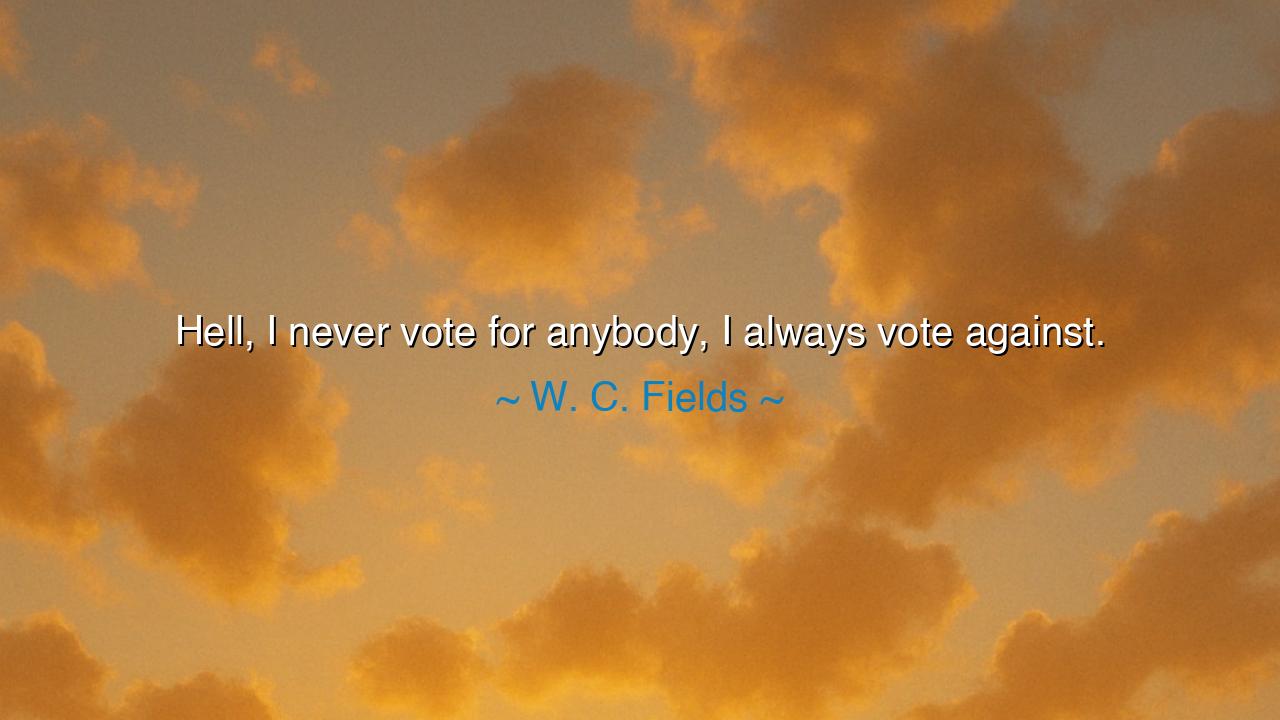
Hell, I never vote for anybody, I always vote against.






Hear the biting wit of W. C. Fields, the American comedian whose humor was laced with cynicism, who once declared: “Hell, I never vote for anybody, I always vote against.” At first, these words may sound like a jest, the grumble of a man who mistrusted both politics and politicians. Yet hidden within the laughter is a truth as sharp as steel: that in the realm of governance, many do not vote from hope, but from fear; not to lift up the worthy, but to prevent the rise of the unworthy. Fields gives voice to the ancient suspicion that power corrupts, and that the choices offered by politics are rarely between good and evil, but between degrees of imperfection.
The origin of this saying lies in the long tradition of democratic disillusionment. Fields, living in an America often swept by corruption, scandal, and the empty promises of leaders, expressed what many citizens felt but dared not say—that sometimes one casts a ballot not in admiration but in desperation. His words reflect a democracy where faith in rulers is thin, and where the act of voting becomes not an offering of trust but a shield against greater harm. In this, he joins a chorus of skeptics through the ages who saw politics as a stage where virtue was scarce and self-interest ruled.
History gives us many examples of this grim wisdom. Consider the late days of the Roman Republic, when elections were dominated by bribery, patronage, and manipulation. Citizens, no longer inspired by great statesmen, often cast their votes to prevent worse evils, fearing the tyranny of ambitious men more than they trusted the virtue of their rivals. In such a time, the ballot was less a flame of hope than a bulwark against disaster. The same spirit echoes in Fields’ words: better to strike down the dangerous than to trust in the promise of the flawed.
Yet his cynicism also carries a deeper warning. If citizens vote only against, never for, the soul of democracy begins to wither. A society that ceases to believe in the possibility of good leadership becomes resigned to mediocrity, and mediocrity invites decline. Fields’ humor points to a bitter truth—that when hope is lost, politics becomes an endless cycle of rejection, where the people’s power is reduced to the mere act of preventing catastrophe. This is not the fullness of civic duty, but the shadow of it.
Still, there is wisdom in his jest. For to vote against corruption, against tyranny, against deceit, is itself an act of vigilance. The people must never be passive, for silence is the ally of the ambitious. Better to cast a vote of rejection than to surrender to apathy. In his rough humor, Fields teaches that even cynicism can be a form of engagement, that even mistrust can serve the cause of liberty—if it awakens the citizen to act.
The lesson for us, then, is balance. We must guard ourselves against blind trust, for no leader is beyond scrutiny. Yet we must also guard ourselves against despair, for if all we do is reject, we may forget how to build. Democracy requires not only resistance to the unworthy, but also the courage to believe in the possibility of better. To vote only against is to protect the present; to vote also for is to invest in the future.
Practically, this means participating not only in elections, but in the daily work of shaping society. Learn the character of leaders, question their promises, and hold them accountable. But also encourage those who live with integrity, nurture voices of honesty and vision, and do not allow cynicism to rob you of hope. For a citizen who votes only against is a guardian; but a citizen who votes both against the corrupt and for the just becomes a builder of nations.
So let us hear Fields’ words not only as jest but as parable: “I never vote for anybody, I always vote against.” It is a reminder of the shadows that stalk politics, but also of the vigilance required of free men and women. Reject the unworthy, yes—but also dare to believe that worthiness can be found. For in the union of resistance and hope lies the true power of the people, and the salvation of democracy itself.






NPNghi Phuong
W. C. Fields' quote almost makes light of the seriousness of voting. It raises the question, though: if most people feel like they're voting against rather than for, how can we ever hope for meaningful political change? Is the ‘lesser of two evils’ approach ultimately detrimental to democracy, or is it simply a reflection of how polarized politics has become?
MDMai Do
It’s intriguing how W. C. Fields’ quote sheds light on the idea of voting as a negative action. In many ways, it implies dissatisfaction with the available options. But is this just a comment on politics, or does it reveal a deeper issue about the way democracy works? Can we ever change this ‘against’ mentality into a more constructive one?
HLHuyen Le
I find this quote to be a bit too cynical, but I get the sentiment. It suggests a mindset where voting feels like choosing the lesser evil rather than someone who actually embodies your values. Is this a common feeling among voters? Should there be more focus on encouraging people to vote for someone, not just against them?
TThue Ta Thi
This quote feels like a reflection of frustration with the political system. It's as if W. C. Fields is acknowledging a lack of genuine choice in elections. Is this a sign of voter disillusionment, or is he just being cynical? Can voting be meaningful when you’re simply voting against someone rather than for someone you truly believe in?